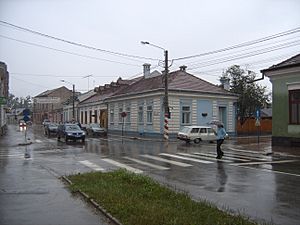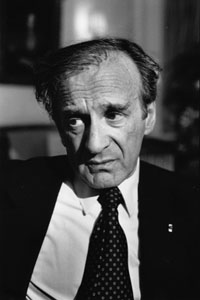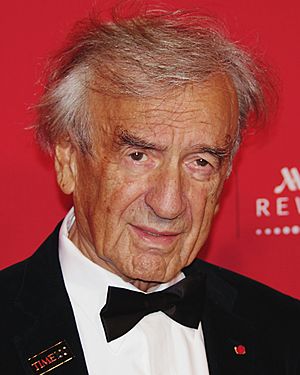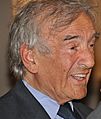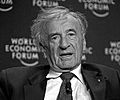Elie Wiesel facts for kids
Quick facts for kids
Elie Wiesel
|
|
|---|---|
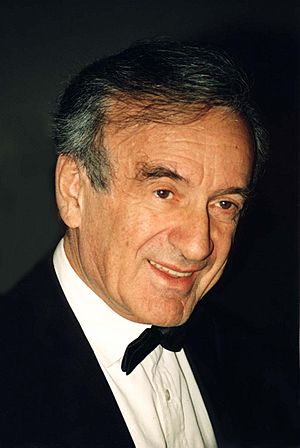
Wiesel in 1996
|
|
| Born | Eliezer Wiesel September 30, 1928 Sighet, Kingdom of Romania |
| Died | July 2, 2016 (aged 87) New York City, U.S. |
| Occupation |
|
| Nationality | American |
| Alma mater | University of Paris |
| Subjects |
|
| Notable works | Night (1960) |
| Notable awards |
|
| Spouse |
Marion Erster Rose
(m. 1969) |
| Children | Elisha |
Elie Wiesel (born Eliezer Wiesel; September 30, 1928 – July 2, 2016) was a famous writer, professor, and human rights activist from Romania who later became an American citizen. He was also a Nobel laureate, meaning he won the Nobel Peace Prize. Wiesel was a Holocaust survivor, which means he lived through the terrible events of the Holocaust.
He wrote 57 books, mostly in French and English. His most famous book is Night, which tells the story of his experiences as a Jewish prisoner. He was held in the Auschwitz and Buchenwald concentration camps during World War II.
Wiesel taught at Boston University, which later created a special center for Jewish studies in his honor. He worked hard for Jewish causes and human rights around the world. He also helped create the United States Holocaust Memorial Museum in Washington, D.C. He spoke out against unfair treatment of people in places like South Africa, Nicaragua, Kosovo, and Sudan. He also strongly condemned the 1915 Armenian genocide. The Los Angeles Times called him "the most important Jew in America" in 2003.
In 1986, Wiesel received the Nobel Peace Prize. The Nobel Committee called him a "messenger to mankind." They said that through his efforts to understand his own painful experiences in the Nazi death camps, and through his work for peace, Wiesel shared a message of "peace, atonement, and human dignity." The committee also noted that Wiesel's dedication began with the suffering of Jewish people but grew to include all oppressed groups. He was a founding member of the New York Human Rights Foundation and worked with them throughout his life.
Contents
Elie Wiesel's Early Life
Elie Wiesel was born in a town called Sighet (now Sighetu Marmației) in the Carpathian Mountains of Romania. His parents were Sarah Feig and Shlomo Wiesel. At home, his family usually spoke Yiddish, but they also spoke German, Hungarian, and Romanian.
Wiesel's father, Shlomo, taught him to care deeply about people and encouraged him to learn Hebrew and read books. His mother, Sarah, encouraged him to study the Torah, which is a holy text in Judaism. Wiesel said his father represented logic and reason, while his mother represented faith.
Elie had three siblings: older sisters Beatrice and Hilda, and a younger sister named Tzipora. Beatrice and Hilda survived the war and later moved to North America. Sadly, Tzipora, Shlomo, and Sarah did not survive the the Holocaust.
Life During the Holocaust
In March 1944, Germany took control of Hungary, which meant the the Holocaust spread to Northern Transylvania. Wiesel was 15 years old. He and his family, along with all the other Jewish people in their town, were forced into special areas called ghettos.
In May 1944, the Hungarian authorities, pressured by Germany, began sending the Jewish community to the Auschwitz concentration camp. Many people, up to 90 percent, were killed as soon as they arrived. Wiesel's mother and younger sister were murdered immediately after they reached Auschwitz.
Elie and his father were chosen to do hard labor as long as they were strong enough. After that, they would also be killed. Wiesel and his father were later moved to the Buchenwald concentration camp. Wiesel told Oprah Winfrey that his main reason for trying to survive Auschwitz was knowing his father was still alive. He said, "I knew that if I died, he would die." His father died in Buchenwald just before the camp was freed. In his book Night, Wiesel remembered feeling ashamed because he heard his father being beaten and could not help him.
Wiesel had the number "A-7713" tattooed on his left arm, which was how prisoners were identified. The U.S. Third Army freed the camp on April 11, 1945.
Elie Wiesel's Career as a Writer
Life in France
After World War II ended and Wiesel was freed, he was taken with 1,000 other child survivors from Buchenwald to a rehabilitation center in France. Wiesel joined a smaller group of boys who wanted to follow Jewish religious laws. They were cared for in a home until 1947.
Afterward, Wiesel went to Paris. There, he learned French and studied literature, philosophy, and psychology at the Sorbonne. He listened to lectures by famous thinkers and spent his evenings reading books by great authors.
By the time he was 19, he started working as a journalist, writing in French. He also taught Hebrew and led a choir. He wrote for newspapers in Israel and France. In 1949, he went to Israel as a reporter and later became an international correspondent for an Israeli newspaper.
For ten years after the war, Wiesel refused to write or talk about his experiences during the Holocaust. He changed his mind after meeting French author François Mauriac, who won the Nobel Prize in Literature in 1952. Mauriac became Wiesel's close friend. Mauriac encouraged him to write about his difficult experiences.
Wiesel first wrote a long memoir in Yiddish called Un di velt hot geshvign (And the World Remained Silent). He then wrote a shorter version in French, La Nuit, in 1955. This book was translated into English as Night in 1960. At first, the book did not sell many copies, but it slowly gained attention.
Eventually, Night was translated into 30 languages, selling ten million copies in the United States. Film director Orson Welles wanted to make it into a movie, but Wiesel said no. He felt that his memoir would lose its deep meaning if it was told without the important silences between his words. In 2006, Oprah Winfrey chose Night for her popular book club, which helped it reach many more readers.
Moving to the United States
In 1955, Wiesel moved to New York City to work as a foreign reporter for an Israeli newspaper. In 1969, he married Marion Erster Rose, who was from Austria. She also translated many of his books. They had one son, Shlomo Elisha Wiesel, named after Wiesel's father.
In the U.S., he wrote over 40 books. Many of them were non-fiction books about the Holocaust and novels. He won many literary awards for his writing. He is considered one of the most important writers to describe the Holocaust from a very personal point of view. Some historians even say that Wiesel helped give the word Holocaust its current meaning, though he felt no single word could fully describe the event. In 1975, he helped start Moment magazine with writer Leonard Fein.
His 1979 book and play The Trial of God are based on a real event he saw in Auschwitz. Three Jewish prisoners, close to death, held a mock trial against God, accusing Him of being unfair to the Jewish people.
Wiesel published two books of memoirs about his own life. The first, All Rivers Run to the Sea, came out in 1994 and covered his life until 1969. The second, And the Sea is Never Full, was published in 1999 and covered the years from 1969 to 1999.
Elie Wiesel's Activism
Wiesel and his wife, Marion, started the Elie Wiesel Foundation for Humanity in 1986. From 1978 to 1986, he led the President's Commission on the Holocaust. This group was important in building the United States Holocaust Memorial Museum in Washington, D.C..
The Holocaust Memorial Museum gives the Elie Wiesel Award to important people who have helped the Museum's goal of fighting hatred, preventing genocide, and promoting human dignity. Sadly, the Foundation lost a lot of money due to a financial scam by Bernard Madoff.
Support for Israel
Wiesel often spoke about the Jewish connection to Jerusalem. He believed Jerusalem was very important to the Jewish people.
Awards and Recognition
Wiesel received the Nobel Peace Prize in 1986 for speaking out against violence, oppression, and racism. The Norwegian Nobel Committee called him "one of the most important spiritual leaders" in a world still facing violence and racism.
He received many other awards and honors for his work. These include the Congressional Gold Medal in 1985, the Presidential Medal of Freedom, and an Award of Excellence from The International Center in New York. He was also chosen to be a member of the American Academy of Arts and Letters in 1996.
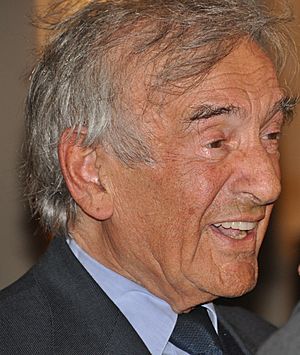
Wiesel became a frequent speaker about the Holocaust. As an activist, he supported many causes. He spoke up for Israel, for Jewish people in the Soviet Union and Ethiopia, for victims of apartheid in South Africa, and for people who disappeared in Argentina. He also advocated for victims of genocide in Bosnia and for the Kurds.
In April 1999, Wiesel gave a famous speech called "The Perils of Indifference" in Washington D.C. In this speech, he criticized people and countries who did nothing while the Holocaust was happening. He explained that being indifferent means being neutral between two sides, which, in this case, meant ignoring the victims of the Holocaust. He believed that even a little attention, good or bad, is better than no attention at all.
In 2003, he helped make public the fact that at least 280,000 Romanian and Ukrainian Jews, along with other groups, were killed in death camps run by Romania.
In early 2006, Wiesel visited Auschwitz with Oprah Winfrey. This visit was shown on The Oprah Winfrey Show. In November 2006, Wiesel received an honorary knighthood in London for his work in Holocaust education in the United Kingdom.
In September 2006, he appeared before the UN Security Council with actor George Clooney. They spoke to bring attention to the humanitarian crisis in Darfur. When Wiesel died, Clooney wrote that Wiesel "carried our pain, our guilt, and our responsibility on his shoulders for generations."
In 2007, Wiesel received the Dayton Literary Peace Prize's Lifetime Achievement Award. That same year, his foundation sent a letter condemning Armenian genocide denial, signed by 53 Nobel laureates, including Wiesel. Wiesel often said that Turkey's efforts to downplay its actions during the Armenian genocide were like killing the victims a second time.
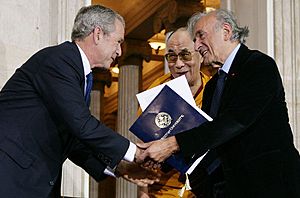
In June 2009, Wiesel visited the Buchenwald concentration camp with US President Barack Obama and German Chancellor Angela Merkel. In 2010, Wiesel became a Distinguished Presidential Fellow at Chapman University in California. He visited the university yearly to meet with students and share his thoughts on history, religion, and other topics.
In July 2009, Wiesel spoke out in support of the minority Tamils in Sri Lanka. He said that "Wherever minorities are being persecuted, we must raise our voices to protest." He added that the Tamil people were being unfairly treated and that this injustice must stop.
In 2009, Wiesel returned to Hungary for the first time since the Holocaust. He participated in a conference and met with the Prime Minister and President. However, in 2012, he protested against Hungary's efforts to downplay its role in the Holocaust and returned an award he had received from the Hungarian government.
Wiesel worked to prevent Iran from developing nuclear weapons, stating that Iran's leaders clearly showed their intentions. He also criticized Hamas for using children as human shields during the 2014 Israel-Gaza conflict.
Teaching and Education
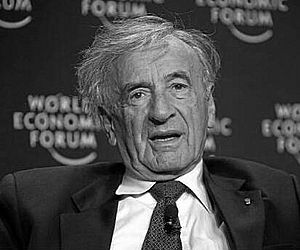
From 1976, Wiesel was a professor of the Humanities at Boston University, teaching in both its religion and philosophy departments. The university later created the Elie Wiesel Center for Jewish Studies in his honor. From 1972 to 1976, Wiesel was a Distinguished Professor at the City University of New York.
In 1982, he was the first Henry Luce Visiting Scholar at Yale University. He also taught courses at Eckerd College. From 1997 to 1999, he was a visiting professor of Judaic Studies at Barnard College of Columbia University.
Personal Life
In 1969, Elie Wiesel married Marion Erster Rose, who was from Austria. She also translated many of his books. They had one son, Shlomo Elisha Wiesel, named after Wiesel's father. The family lived in Greenwich, Connecticut.
In February 2007, Wiesel was attacked in a hotel by a man who denied the Holocaust happened. Wiesel was not hurt. The attacker was later arrested.
In 2011, Wiesel was the commencement speaker at Washington University in St. Louis. In 2012, Wiesel spoke out against the practice of posthumously baptizing Jews by members of the Church of Jesus Christ of Latter-day Saints without permission. He asked presidential candidate Mitt Romney to speak against it.
Death and Legacy
Elie Wiesel passed away on July 2, 2016, at his home in Manhattan, at the age of 87. After a private funeral service, he was buried at the Sharon Gardens Cemetery in Valhalla, New York, on July 3.
Utah senator Orrin Hatch honored Wiesel in a speech, saying that "With Elie's passing, we have lost a beacon of humanity and hope. We have lost a hero of human rights and a luminary of Holocaust literature."
In 2018, antisemitic graffiti was found on the house where Wiesel was born, showing that the fight against hatred continues.
Awards and Honors
- Prix de l'Université de la Langue Française (Prix Rivarol) for The Town Beyond the Wall, 1963.
- National Jewish Book Award for The Town Beyond the Wall, 1965.
- Ingram Merrill award, 1964.
- Prix Médicis for A Beggar in Jerusalem, 1968.
- National Jewish Book Award for Souls on Fire: Portraits and Legends of Hasidic Masters, 1973.
- Jewish Heritage Award, Haifa University, 1975.
- Holocaust Memorial Award, New York Society of Clinical Psychologists, 1975.
- S.Y. Agnon Medal, 1980.
- Jabotinsky Medal, State of Israel, 1980.
- Prix Livre Inter, France, for The Testament, 1980.
- Grand Prize in Literature from the City of Paris for The Fifth Son, 1983.
- Commander in the French Legion of Honor, 1984.
- U.S. Congressional Gold Medal, 1984.
- Four Freedom Award for the Freedom of Worship, 1985.
- Medal of Liberty, 1986.
- Nobel Peace Prize, 1986.
- Grand Officer in the French Legion of Honor, 1990.
- Presidential Medal of Freedom, 1992
- Niebuhr Medal, Elmhurst College, Illinois, 1995.
- Golden Plate Award of the American Academy of Achievement, 1996.
- Grand Cross in the French Legion of Honor, 2000.
- Order of the Star of Romania, 2002.
- Man of the Year award, Tel Aviv Museum of Art, 2005.
- Light of Truth award, International Campaign for Tibet, 2005.
- Honorary Knighthood, United Kingdom, 2006.
- Honorary Visiting Professor of Humanities, Rochester College, 2008.
- National Humanities Medal, 2009.
- Norman Mailer Prize, Lifetime Achievement, 2011.
- Loebenberg Humanitarian Award, Florida Holocaust Museum, 2012.
- Kenyon Review Award for Literary Achievement, 2012
- Nadav Award, 2012.
- S. Roger Horchow Award for Greatest Public Service by a Private Citizen, Jefferson Awards, 2013.
- John Jay Medal for Justice John Jay College, 2014.
- Bust of Wiesel was carved on the Human Rights Porch of the Washington National Cathedral in Washington, D.C., 2021.
Honorary Degrees
Wiesel received more than 90 honorary degrees from colleges and universities around the world.
- Doctor of Humane Letters, Lehigh University, Bethlehem, Pennsylvania, 1985.
- Doctor of Humane Letters, DePaul University, Chicago, Illinois, 1997.
- Doctorate, Seton Hall University, New Jersey, 1998.
- Doctor of Humanities, Michigan State University, 1999.
- Doctorate, McDaniel College, Westminster, Maryland, 2005.
- Doctor of Humane Letters, Chapman University, 2005.
- Doctor of Humane Letters, Dartmouth College, 2006.
- Doctor of Humane Letters, Cabrini College, Radnor, Pennsylvania, 2007.
- Doctor of Humane Letters, University of Vermont, 2007.
- Doctor of Humanities, Oakland University, Rochester, Michigan, 2007.
- Doctor of Letters, City College of New York, 2008.
- Doctorate, Tel Aviv University, 2008.
- Doctorate, Weizmann Institute, Rehovot, Israel, 2008.
- Doctor of Humane Letters, Bucknell University, Lewisburg, Pennsylvania, 2009.
- Doctor of Letters, Lehigh University, Bethlehem, Pennsylvania, 2010.
- Doctor of Humane Letters, Washington University in St. Louis, 2011.
- Doctor of Humane Letters, College of Charleston, 2011.
- Doctorate, University of Warsaw, June 25, 2012.
- Doctorate, The University of British Columbia, September 10, 2012.
- Doctorate, Pontifical University of John Paul II, June 30, 2015
Images for kids
See also
 In Spanish: Elie Wiesel para niños
In Spanish: Elie Wiesel para niños
- The Boys of Buchenwald – a documentary about the orphanage where he stayed after the Holocaust
- Elie Wiesel bibliography
- United States Holocaust Memorial Museum
- God on Trial – a 2008 TV show based on his book The Trial of God
- List of Jewish Nobel laureates
 | Ernest Everett Just |
 | Mary Jackson |
 | Emmett Chappelle |
 | Marie Maynard Daly |


